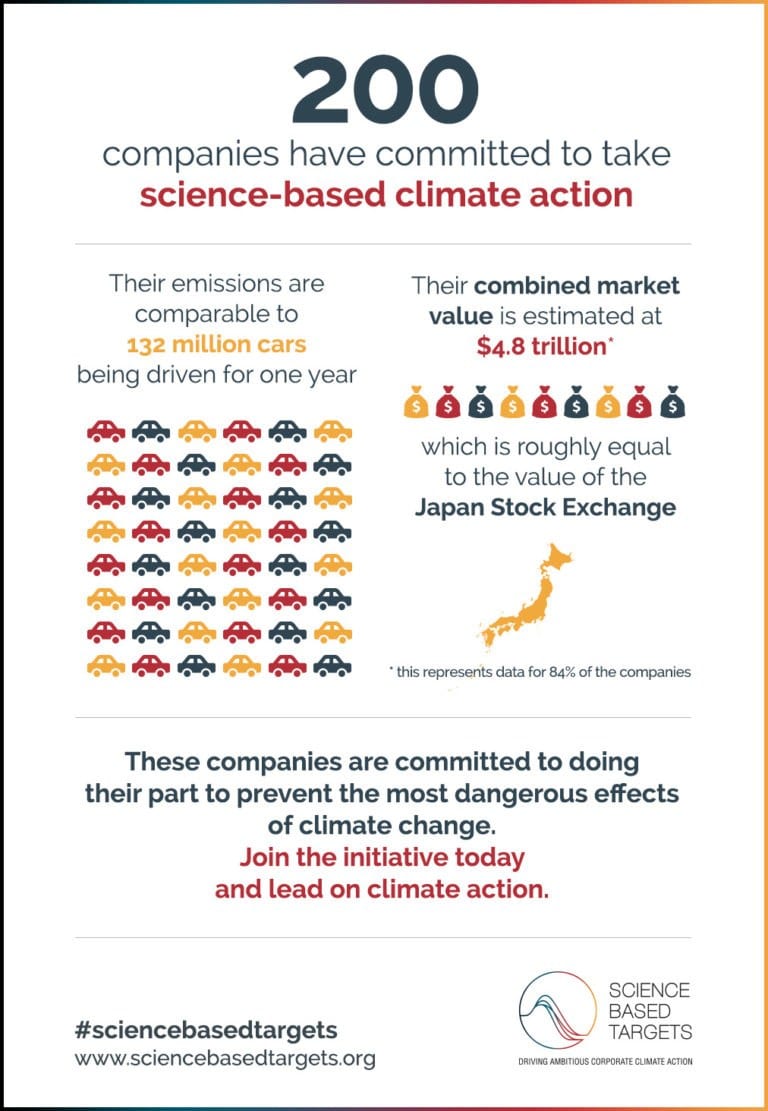
Leading the way: 200 companies commit to setting science-based targets
Nov 23rd 2016
Last week, the Science Based Target initiative hit a milestone: 200 leading companies have now committed to setting emission reduction targets that are based on climate science. Since the Call to Action run by the initiative started just 18 months ago, it has grown by an average of more than 2 commitments per week: setting the standard for meaningful corporate climate action that is sufficiently ambitious to help keep global warming well below 2 degrees. These early adopters are helping to reduce the harmful effects of climate change, driving innovation, increasing profits and reducing business risk. They are leading the way for others to follow.
Reaching the 200 committed companies mark in the middle of COP22 was a clear sign that the momentum on climate change action is building, even in times of political uncertainty, and that non-state actors are increasingly playing a leading role. Action by the global business community is essential for governments to deliver on their promises under the Paris Agreement. Business also has a critical role to play in closing the gap between the efforts pledged by governments and the emission reductions required. Companies need to set ambitious greenhouse gas emission reduction targets and put in place associated strategies to ensure that the transition to a low-carbon society happens fast enough to avert the worst impacts of climate change.
Making a significant difference
Businesses that set science-based targets are embracing change and listening to their customers, investors and other stakeholders. They will be ahead of the game when new policies and regulations from the implementation of the Paris Agreement come into force. As leaders on climate action they are also well positioned to influence policy makers.
The 200 companies who have joined the Science Based Targets initiative to date have an estimated combined market value of USD $4.8 trillion, comparable to the total estimated value of the Japanese stock exchange group, and are collectively responsible for 627 million metric tonnes of direct CO2e emissions. They represent businesses across 33 countries and from many sectors including retail, food & beverage, electric utilities and automotives.

The 26 companies that have already had their targets approved by the initiative represent 269 million metric tonnes of CO2e emissions, which is roughly comparable to the total annual emissions of Egypt – the 30th largest emitter in the world. This demonstrates the potential science-based targets have to make a significant difference towards transitioning to a low-carbon economy and a cleaner, healthier planet.
A multiplier effect
Across the world, it is clear that those companies that realise the growth opportunity that climate action presents, are the ones setting science-based emissions reduction targets.
Mediclinic Southern Africa was the 200th company to commit to setting a science-based target. Francois Bester, their Environmental Systems Manager said, “For Mediclinic, setting a science-based target makes business sense, we see direct benefits from emissions reduction efforts through cost savings and energy supply security.”
Science-based targets have knock on effects for companies’ suppliers and customers. One of the criteria for having a target approved is that if a significant proportion of a company’s emissions are concentrated in its value chain, then the company must set an ambitious target to reduce these emissions too. This is likely to mean engaging with suppliers to reduce their emissions, and looking at how to reduce the footprint of the products once they are in use.
Businesses with science-based targets can become powerful change agents beyond their own office or factory walls, driving industries and sectors to take into consideration their responsibility for safeguarding the climate. One striking example of this is Walmart, which recently committed to reduce CO2e emissions across its value chain by one billion tonnes by 2030. Considering that this is the largest retailer in the world, with a vast network of suppliers and millions of customers, this is a real game changer.
Action across value chains also unlocks more opportunities. Businesses do not operate in silos. Having a science-based target motivates companies to identify shared reduction opportunities, move to greener suppliers, improve the energy efficiency of products, switch to more sustainable inputs, and rethink distribution networks.
With more companies promoting low carbon development across their value chains, and increasing sector-wide competition to innovate and look to the long-term, the momentum behind the Science Based Targets initiative will only increase. Ultimately, we believe science-based target setting will, and should, become the new ‘business as usual’, helping to unlock the benefits of a low carbon economy at a global level.